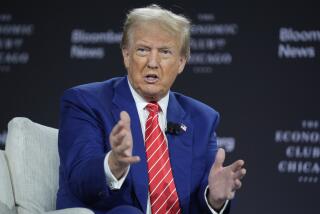All jokes aside, Trump’s ‘covfefe’ tweet sparks questions too
- Share via
Reporting from Washington — President Trump sparked a global kerfuffle over “covfefe” with his bizarrely truncated tweet just minutes into Wednesday, spawning countless jokes across Twitter but also more serious questions for which the White House gave no answers.
Press Secretary Sean Spicer, during an unusually short 11-minute briefing in which he insisted not be on camera, declined to give any explanation for Trump’s tweet posted just after midnight. Nor would he translate what the president was trying to say in the garbled message that broke off mid-sentence.
But Spicer told reporters that the public should not be concerned that the president sent what the questioner called “somewhat of an incoherent tweet.”
“The president and a small group of people know exactly what he meant,” Spicer said.
Trump may have been simply complaining yet again about negative press “coverage” of his presidency when he tapped out: “Despite the constant negative press covfefe”. Period. The message stopped there. And it stayed online for more than five hours, prompting jokes and confusion across the Internet even before his hirelings in the White House press office were awake.
In the morning, the message was deleted and Trump seemed to welcome the tempest he’d stirred up. At 6:09 a.m. Eastern time he posted, “Who can figure out the true meaning of “covfefe” ??? Enjoy!”
Speculation about what Trump had tweeted — and why — consumed hours of cable TV news chatter for the day, creating a brief distraction for the president from criticism over the federal investigation into Trump’s connections to Russia and his imminent decision on whether to withdraw from the Paris climate accord. Many critics on Twitter suggested that distraction is exactly what Trump hoped to achieve.
By late afternoon, “covfefe” had been used more than 1.37 million times on Twitter, Facebook and Instagram, according to analysis for The Times by Brandwatch, a social media analytics firm.
The actor Paul Reubens, writing as his television persona Pee-wee Herman, declared “covfefe” the word of the day. Late-night host Jimmy Kimmel wrote on Twitter: “what makes me saddest is that I know I’ll never write anything funnier than #covfefe.”
Among the responses on Twitter, many in foreign languages, were some that suggested that Trump, a teetotaler, was “drunk-tweeting” or, alone in the White House, under the influence of drugs.
Professional as well as amateur wits of the Internet disagreed over how to pronounce Trump’s neologism. Associated Press went with “cuv-fey-fey,” suggesting a Spanish pronunciation, as did some others who suggested covfefe rhymed with “jefe,” the Spanish word for “chief” (pronounced hef-ay). But others thought the second syllable should rhyme with “leaf.”
Although the word was considered most likely a misspelling of the word “coverage,” Spicer, Trump’s top interpreter as White House press secretary, didn’t offer that explanation. Instead, speaking for a boss who does not admit to mistakes, he insisted — against all appearances — that this was no mistake.
Whatever it was, Trump’s tweet did raise concerns about the health of a president who is 70 years old, overweight and just returned from a jam-packed eight-day trip across the Middle East and Europe. Conservative writer David Frum, a former aide to President George W. Bush, tweeted his speculation that Trump may have experienced a spasm while his Twitter feed was live, and lost consciousness.
“Because typos are rapidly fixed. This looks as if the president spasmed, passed out — and nobody on staff noticed,” wrote Frum, who has been a frequent critic of Trump.
However innocent the truth of this matter, speculation about Trump’s mental and physical health follows a long history of presidents hiding the facts about troubling medical conditions from the public.
White House staff initially did not disclose a heart attack suffered by President Eisenhower. Kennedy kept secret that he had a rare autoimmune disorder called Addison’s disease. Reagan’s speech patterns showed early signs of dementia during his final years in office, a fact reported only after he left the White House.
Trump has not provided the sort of detailed medical records that recent predecessors and presidential nominees have. In September, his physician Harold Bornstein said Trump was in “excellent physical health,” in a letter released by Trump’s campaign without medical documentation.
“There is no family history of premature cardiac or neoplastic disease,” the doctor wrote. “Mr. Trump’s parents, Mary and Fred, lived into their late 80s and 90s.”
Twitter: @ByBrianBennett
More to Read
Get the L.A. Times Politics newsletter
Deeply reported insights into legislation, politics and policy from Sacramento, Washington and beyond. In your inbox three times per week.
You may occasionally receive promotional content from the Los Angeles Times.











